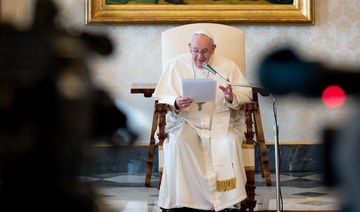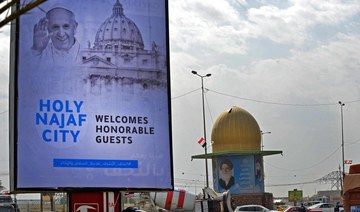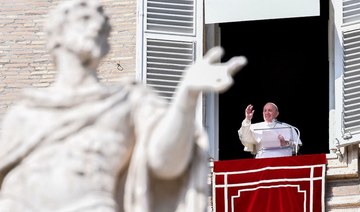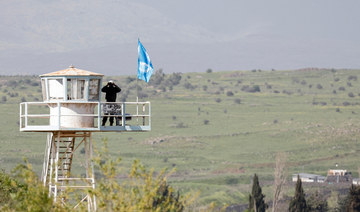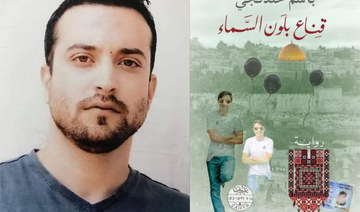ROME: Pope Francis, the head of the Roman Catholic Church, will become the first pontiff ever to set foot in Iraq, where he hopes to encourage the dwindling Christian community to remain in their ancient homeland while also extending a hand of friendship to the Islamic world.
The three-day “pilgrimage” comes despite a recent spike in coronavirus cases in Iraq and an upsurge in violence. Francis arrives just days after a rocket attack on the Ain Al-Assad base in Iraq’s western desert, which hosts US-led coalition troops.
One civilian contractor was killed in Wednesday’s barrage, which the US has blamed on Iran-backed militias. Benedict XVI, who resigned as pontiff eight years ago, warned in an interview on Monday that the visit is “a dangerous trip: for reasons of security and for coronavirus.”
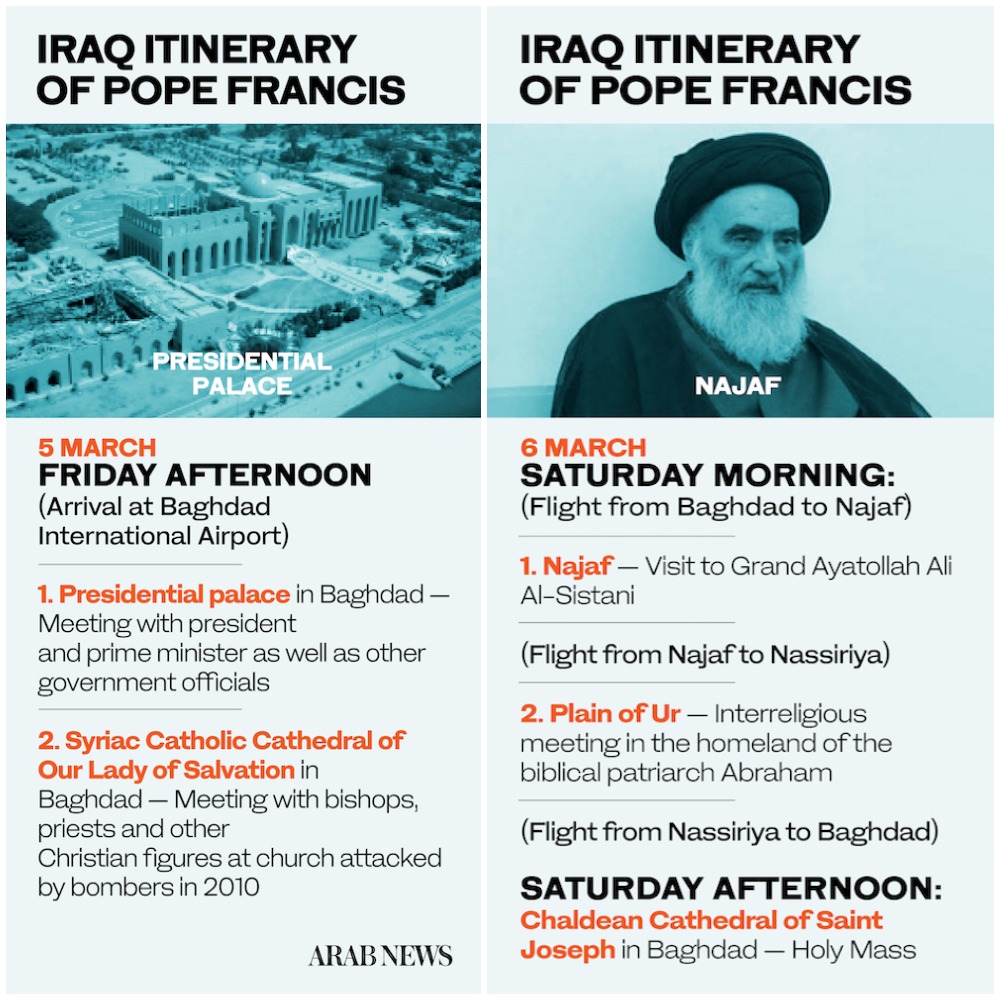
Confirming the visit was still going ahead in his weekly address on Wednesday, Francis said: “For a long time I have wanted to meet these people who have suffered so much. I ask you to accompany this apostolic journey with your prayers so that it may take place in the best possible way and bear the hoped-for fruits.
“The Iraqi people are waiting for us, they were waiting for Saint John Paul II, who was forbidden to go. One cannot disappoint a people for the second time. Let us pray that this journey will be successful.”
This is Francis’ first trip abroad in about 15 months due to the coronavirus pandemic and subsequent restrictions on movement. Although the 84-year-old Argentine pontiff and his entourage have all been vaccinated against COVID-19, no such inoculation campaign has taken place in Iraq. The majority of the country will be under strict lockdown during his visit and movement between provinces will be restricted.
On Tuesday, a spokesman for the pope said he would be traveling in an armored vehicle — not his usual white ‘popemobile’ — and that he would not be meeting crowds, except those attending Mass in the northern Kurdish city of Irbil on Sunday.
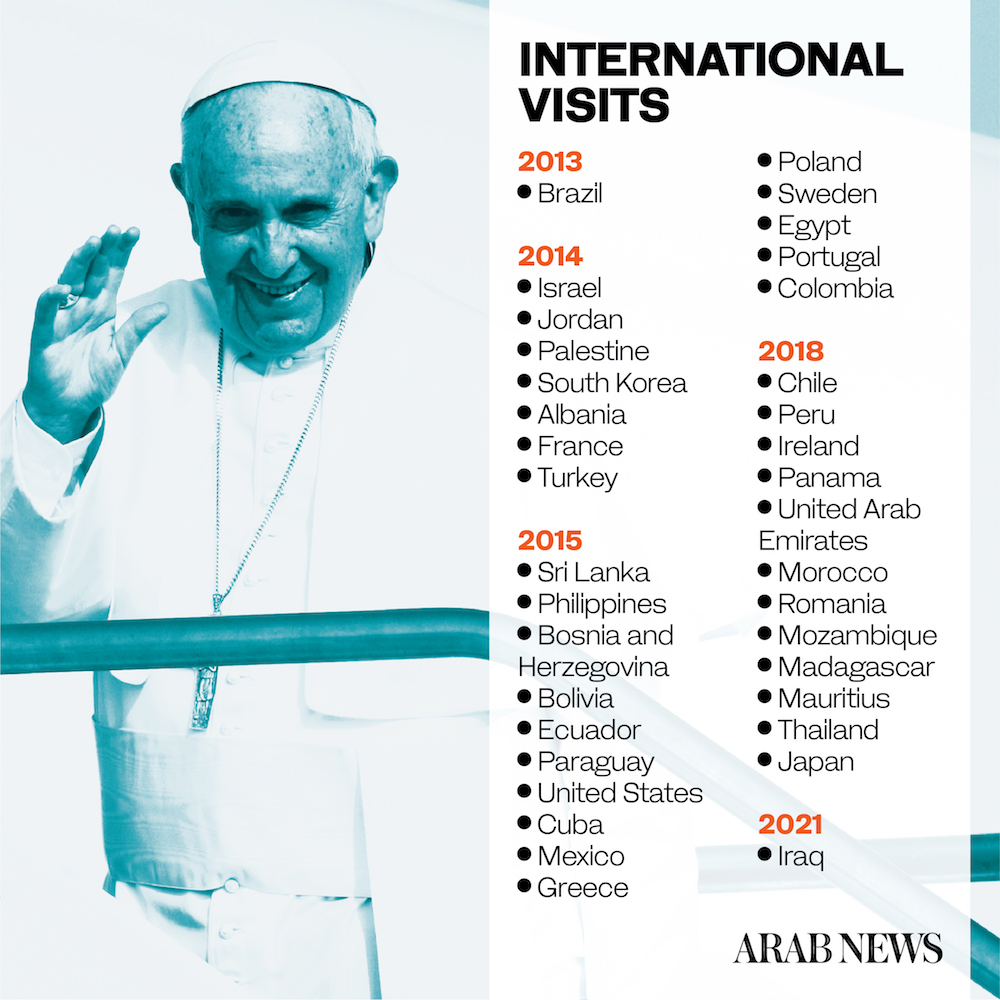
“This is a particular situation, that’s why the transports will all be in a closed vehicle, meaning it will be complicated to see the pope on the streets,” Matteo Brunei, the spokesman, said in a press briefing attended by Arab News. “There will be a number of meetings but none will be more than a few hundred people.”
Francis touches down in Baghdad on Friday, where he will be welcomed at the airport by Mustafa Al-Kadhimi, the Iraqi prime minister, in the first meeting between a pope and an Iraqi PM since 2008.
He will then head to the presidential palace for a private meeting with President Barham Salih, who will introduce him to local political and religious authorities. Salih has met the pope in Rome on two occasions: the first time on Nov. 24, 2018, and against on Jan. 25 last year.

Pope Francis begins his historic trip to war-scarred Iraq tomorrow, defying security concerns and the coronavirus pandemic to comfort one of the world's oldest and most persecuted Christian communities. (AFP)
In the afternoon, Francis will meet with the Christian community at the Syrian Catholic Cathedral of Our Lady of Perpetual Help, where at least 47 Christians died in a Daesh attack in 2010. At the church, restored in 2012, he will be welcomed by Patriarch Joseph Younan.
Perhaps the most keenly anticipated leg of the visit falls on Saturday, when Francis travels to Najaf, the shrine city where Imam Ali, the fourth Islamic caliph, is buried. Here Francis will meet with the 90-year-old Grand Ayatollah Ali Al-Sistani, the spiritual leader of Iraq’s Shiites.
Francis became the first pope to visit the Arabian Peninsula two years ago when he met with Sunni cleric Sheikh Ahmed al-Tayeb, the grand imam of Al-Azhar, in Abu Dhabi. There, the two faith leaders signed a document on “human fraternity for world peace” and issued a joint call for freedom of belief.
THENUMBER
1,445 km
* Distance Pope Francis will cover within Iraq by plane and helicopter.
Saturday’s visit to Najaf will be the first face-to-face meeting between a Catholic pontiff and a Shiite ayatollah. The meeting at Al-Sistani’s modest home is billed as “a courtesy visit” — so no joint declaration is expected, although a verbal statement is likely. It will nevertheless mark a symbolic moment whereby the pope extends a hand of friendship to the other main branch of Islam.
There are significant geopolitical undertones, however. Al-Sistani is widely seen as a counterweight to Iran’s influence in Iraq and among Shiites as a whole. By meeting with him, Francis is effectively recognizing Sistani as the pre-eminent voice of Shiite Islam over his powerful rival, Iran’s Supreme Leader Ali Khamenei.
Al-Sistani commands immense respect among Iraq’s Shiite majority. Thousands of young men heeded his 2014 fatwa to take up arms against Daesh when the group made lightning advances in the country’s north. His sermons, often delivered through representatives, can have far-reaching political consequences.
A show of solidarity from Al-Sistani now might also give Iraq’s Christians a measure of protection from Iraq’s marauding Shiite militias, which have terrorized Christian families and prevented many from returning home from internal displacement.
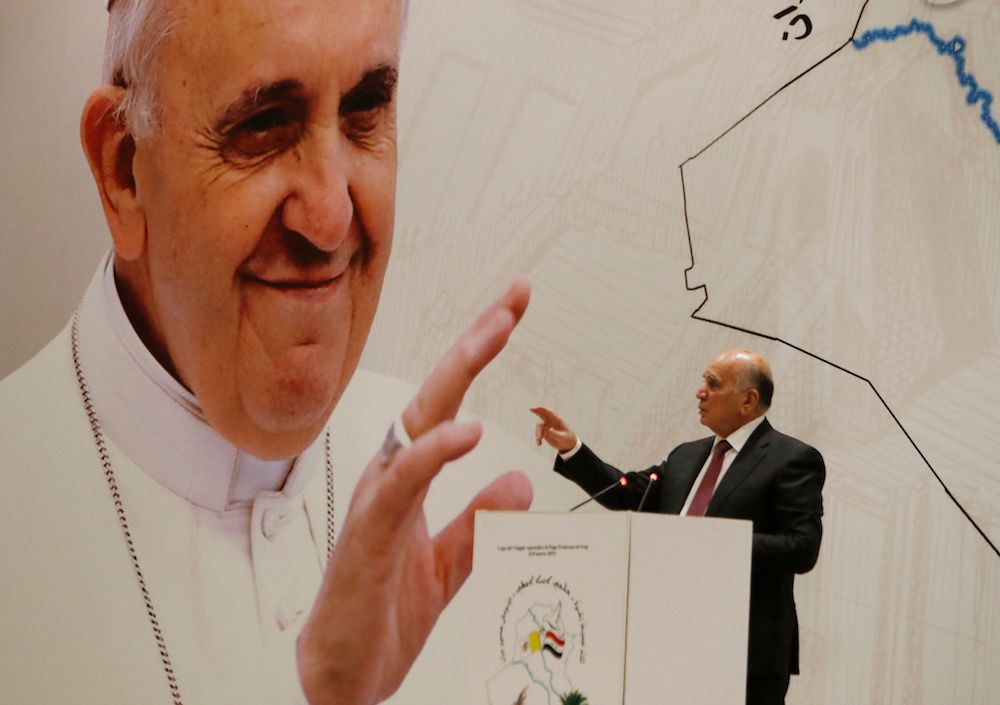
Iraqi Foreign Minister Fuad Hussein holds a press conference at the Babylon Hotel in the capital Baghdad, on March 4, 2021, on the eve of the first papal visit to the country. (AFP)
Following his meeting with Al-Sistani, Francis will visit the ancient city of Ur in the present-day southern province of Dhi Qar, considered in the Bible to be Abraham’s birthplace.
There, an interreligious meeting is scheduled with representatives of all faiths present in Iraq, including the Yazidis — an ancient culture brought to brink of annihilation by Daesh fanatics when the militant group launched a campaign of slaughter and rape in their homeland of Sinjar in August 2014.
On Saturday afternoon, Francis will celebrate Mass in Baghdad’s Chaldean cathedral — a first in the Chaldean rite for a pontiff of the Catholic Church — together with Cardinal Louis Raphael Sako, patriarch of the Chaldeans.
READ MORE
Pope Francis said in a video message on Thursday that he wants to be seen by the Iraqi people as a “penitent pilgrim” asking God for “forgiveness and reconciliation after years of war and terrorism,” and for “consolation of hearts and the healing of wounds.” More here.
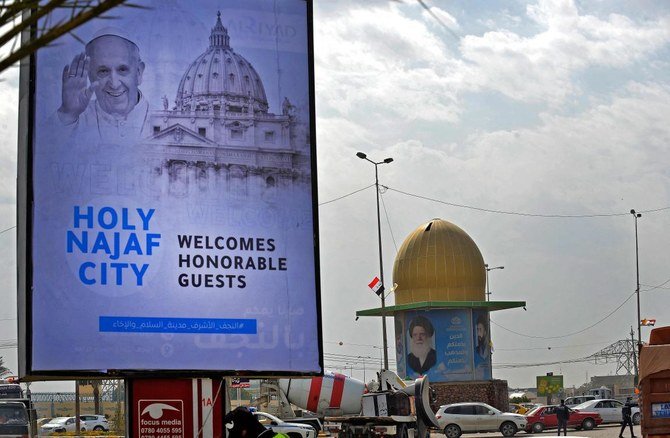
On Sunday Francis will reach Irbil, capital of Iraqi Kurdistan, where he will be welcomed by the autonomous region’s President Nechirvan Barzani and Prime Minister Masrour Barzani. Although security is far better in Irbil compared to other Iraqi cities, Western targets came under rocket attack there in mid-February.
The Sunni Muslim-majority Kurdistan Region has long been considered a sanctuary for Iraq’s persecuted ethno-religious minorities. During the war with Daesh, tens of thousands of Christians and Yazidis fled to hastily built displacement camps behind Peshmerga lines. Slow reconstruction efforts and ongoing security concerns have left many waiting impatiently to return.

From Irbil, Francis will fly by helicopter to Nineveh’s provincial capital Mosul, which from 2014 to 2017 was the de facto capital of Daesh’s self-proclaimed caliphate. Huge areas of the once flourishing commercial hub were leveled in the US-led coalition’s flight to reclaim the city, and many of its precious religious artifacts were vandalized by Daesh fanatics.
Here Francis will pray to honor the victims in the Square of the Four Churches — Syro-Catholic, Syriac Orthodox, Armenian Orthodox and Chaldean. Francis will be welcomed there by Mosul’s Archbishop Najib Mikhael Moussa and the local governor.
He will then fly by helicopter to Qaraqosh, a Christian-majority city where on Aug. 6-7, 2014, about 45,000 people were expelled by Daesh hordes. He will say the Angelus Sunday prayer in the Church of the Immaculate Conception, which was badly damaged by Daesh and used as a shooting range.
Mass at Franso Hariri stadium in Irbil will be Francis’ last appointment in Iraq. He is then scheduled to fly back to Rome from Baghdad on Monday.




